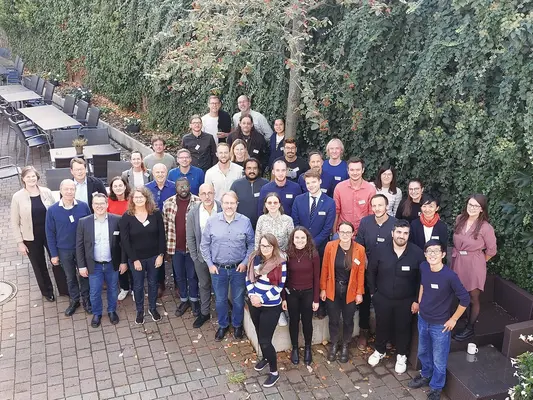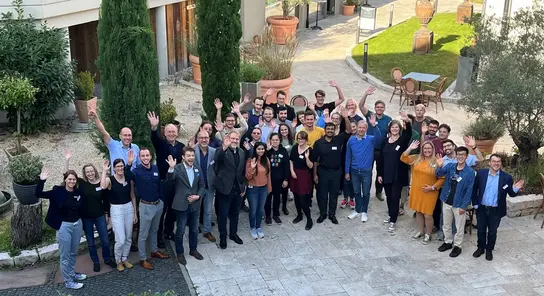News
Annual Meeting and Young Researcher Retreat of the CoViPa Research Network 2024

From September 30 to October 2, 2024, the CoViPa Research Network held its annual conference in the beautiful city of Würzburg, accompanied by an inspiring Young Researcher Retreat. The event placed great emphasis on exchange and the expansion of collaborations both within our network and with external partners.
A highlight of the event was the participation of the three other networks funded under the pandemic research call by the Helmholtz association. CORAERO, LOKI and COCAP presented their projects, contributing to a valuable scientific dialogue focused on pandemic preparedness. This interaction allowed us to gain new perspectives on shared challenges and to identify synergies for future research efforts, aligning with our overarching goal of enhancing readiness for potential pandemics.
The Young Researcher Retreat focused on the crucial topic of effective team communication. Young researchers gained insights into tools and methods that can enhance collaboration and create a productive work environment. The workshop provided space for discussions and practical exercises, which were very well received by participants.
Overall, the meeting was a great success. Participants left Würzburg not only with new ideas and insights but also with strengthened networks and partnerships. We look forward to integrating these valuable impulses into the ongoing work of the CoViPa network, driving us closer to our goal of pandemic preparedness.
Annual COVIPA Retreat 2023 in Heidelberg

The COVIPA Annual Meeting and the PREPARE Young Researcher Retreat 2023 took place in Heidelberg and Leimen. The meeting incorporated a poster presentation session aimed at fostering understanding of each other's projects and receiving input from peers. Social activities and the scientific agenda with projects predominantly presented by doctoral researchers, were also highlights, with prizes awarded for the best presentations.
NEW INFECTION MECHANISM IN CORONAVIRUS DISCOVERED
Researchers from Heidelberg Medical Faculty, Heidelberg University Hospital and German Cancer Research Center investigate molecular relationships that promote infection and spread of SARS- coronavirus-2 / Results provide starting point for development of antiviral therapies
The SARS-coronavirus-2, responsible for the COVID-19 pandemic, triggers a stress response in infected cells that facilitates the virus' entry into the cells. In their search for the underlying molecular mechanism, researchers from the Heidelberg University Medical School and Heidelberg University Hospital (UKHD), in collaboration with the German Cancer Research Center (DKFZ) and the University of Bristol, identified a cellular factor called NUAK2. Its amount is increased by the SARS-CoV-2 mediated cellular stress response and it promotes the entry and spread of the coronavirus in human cells. Thus, NUAK2 could be a new target for the development of antiviral agents.
The research team led by Professor Dr. Dr. h.c. Ralf Bartenschlager, Head of the Division of Molecular Virology at the Center for Infectious Diseases at UKHD and Dr. Vibhu Prasad, Scientist in Molecular Virology has now analyzed the molecular pathways involved in SARS-CoV-2 infection of the cell. The cellular protein NUAK2 plays a central role in this process.
The Heidelberg scientists blocked NUAK2 in the cells and observed reduced infection of cells by SARS-CoV-2 particles. In subsequent studies, the scientists found that NUAK2 regulates the amount of ACE2, the receptor for the virus, on the cell surface. "In addition, our studies showed that increased NUAK2 levels in infected cells increased the number of receptors in uninfected cells as well. As a result, these cells also became more infected with SARS-CoV-2," reports Dr. Vibhu Prasad.
And these correlations could be demonstrated not only with SARS-CoV-2, but also with other coronavirus species such as human coronavirus-229E - a "common cold virus" - and the very dangerous MERS coronavirus, which can be transmitted from camels to humans.
"The research findings provide valuable insights into the intricate mechanisms of SARS-CoV-2 infection and spread. Understanding the role of NUAK2 opens new avenues for therapeutic intervention. By interrupting NUAK2-regulated virus entry, we might be able to prevent the spread of the virus and thereby mitigate the effects of coronavirus infections," says Professor Ralf Bartenschlager.
Prasad V, Cerikan B, Stahl Y, et al. Enhanced SARS-CoV-2 entry via UPR-dependent AMPK-related kinase NUAK2 [published online ahead of print, 2023 Jun 29]. Mol Cell. 2023;S1097-2765(23)00467-7. doi:10.1016/j.molcel.2023.06.020
Source: https://www.klinikum.uni-heidelberg.de/newsroom/new-infection-mechanism-in-coronavirus-discovered/